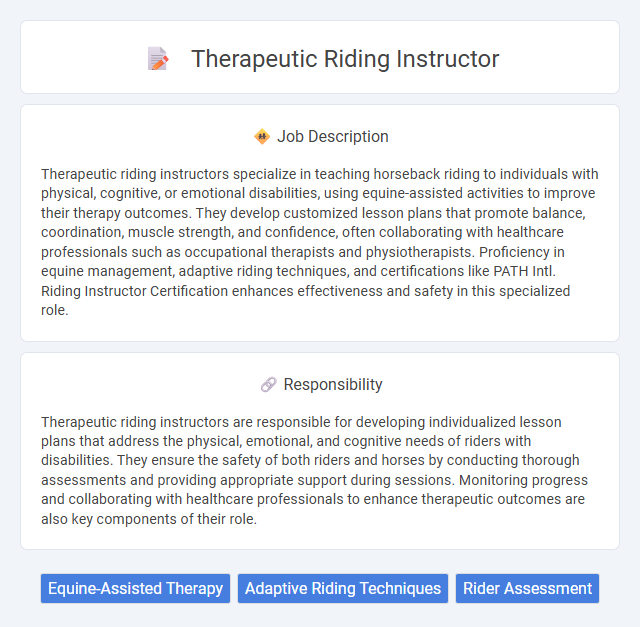
Therapeutic riding instructors specialize in teaching horseback riding to individuals with physical, cognitive, or emotional disabilities, using equine-assisted activities to improve their therapy outcomes. They develop customized lesson plans that promote balance, coordination, muscle strength, and confidence, often collaborating with healthcare professionals such as occupational therapists and physiotherapists. Proficiency in equine management, adaptive riding techniques, and certifications like PATH Intl. Riding Instructor Certification enhances effectiveness and safety in this specialized role.
Individuals with a passion for helping people with physical, emotional, or cognitive disabilities may find a career as a Therapeutic Riding Instructor highly suitable. Those possessing strong communication skills, patience, and a basic knowledge of horseback riding techniques are likely to excel in this role. People who thrive in adaptive learning environments and enjoy fostering confidence and independence in others probably have the attributes needed to succeed as therapeutic riding instructors.
Qualification
Therapeutic riding instructors typically require certification from recognized organizations such as the Professional Association of Therapeutic Horsemanship International (PATH Intl.) or the Certified Therapeutic Riding Instructor (CTRI) credential. Essential qualifications include knowledge of equine behavior, anatomy, and adaptive riding techniques tailored for individuals with physical, cognitive, or emotional disabilities. Experience in both horseback riding and therapeutic practices, combined with first aid and CPR certification, is crucial for ensuring client safety and effective instruction.
Responsibility
Therapeutic riding instructors are responsible for developing individualized lesson plans that address the physical, emotional, and cognitive needs of riders with disabilities. They ensure the safety of both riders and horses by conducting thorough assessments and providing appropriate support during sessions. Monitoring progress and collaborating with healthcare professionals to enhance therapeutic outcomes are also key components of their role.
Benefit
Therapeutic riding instructors are likely to significantly enhance participants' physical and emotional well-being through structured equine-assisted activities. They probably contribute to increased muscle strength, balance, and coordination in individuals with disabilities, fostering improved confidence and independence. This role may also promote social interaction and psychological healing, making it a potentially rewarding and impactful career choice.
Challenge
Therapeutic riding instructors likely face challenges related to managing diverse client needs and varying physical or cognitive abilities. Adapting teaching techniques to ensure safety while promoting confidence and skill development may require continuous learning and flexibility. Balancing emotional demands and maintaining patience during sessions could be a frequent aspect of the role.
Career Advancement
Therapeutic riding instructors can advance their careers by obtaining specialized certifications such as PATH International or Equine Assisted Growth and Learning Association credentials. Progression often includes roles like lead instructor, program coordinator, or facility manager, which require enhanced expertise in adaptive riding techniques and client care. Pursuing continuing education and networking within equine therapy communities significantly increases opportunities for leadership positions and professional growth.
Key Terms
Equine-Assisted Therapy
Therapeutic riding instructors specialize in Equine-Assisted Therapy, using horse riding to improve physical, emotional, and cognitive abilities in individuals with disabilities. They develop customized riding programs to enhance balance, coordination, and confidence, collaborating with healthcare professionals to ensure therapeutic goals are met. Expertise in horse behavior, safety protocols, and adaptive techniques is essential for promoting effective, patient-centered therapy sessions.
Adaptive Riding Techniques
Therapeutic riding instructors specialize in adaptive riding techniques that tailor equestrian activities to individuals with physical, emotional, or cognitive disabilities. These professionals assess riders' unique needs to develop personalized lesson plans that enhance balance, coordination, and confidence through modified riding equipment and support. Mastery of adaptive methods ensures safe, effective sessions that promote therapeutic benefits and rider independence.
Rider Assessment
Therapeutic riding instructors specialize in evaluating riders' physical, cognitive, and emotional abilities to tailor equine-assisted activities effectively. Detailed rider assessments identify individual goals, ensuring personalized therapy plans that promote improved balance, coordination, and confidence. These evaluations are integral to optimizing therapeutic outcomes and tracking progress throughout the rider's engagement.
 kuljobs.com
kuljobs.com